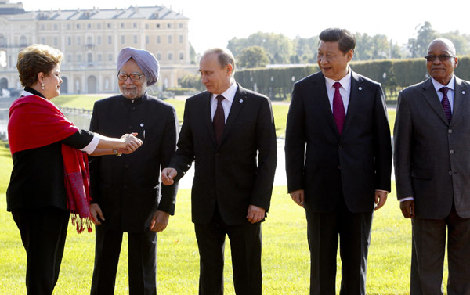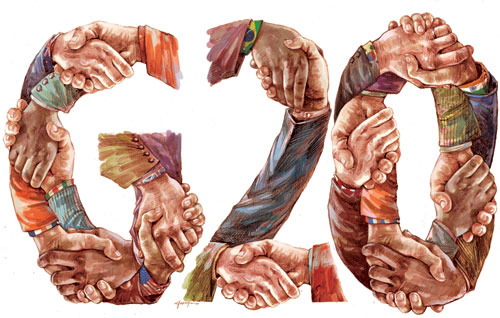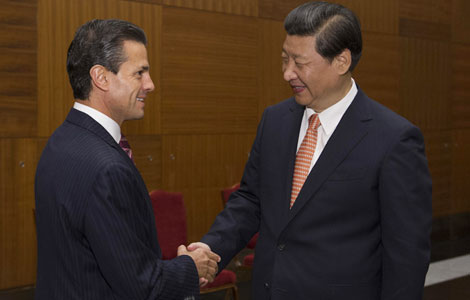Emerging markets must be heard
Updated: 2013-09-06 02:57
(China Daily)
|
||||||||
Editor's Note: Ahead of the Group of 20 summit of the world's largest economies in Russia, the International Monetary Fund noted that developing countries have been hardest hit in the past few months by the US central bank's warning that it will soon taper its massive bond-buying program that poured cash into the economy to stimulate it. The subsequent slowdown in emerging markets, particularly Brazil, China and India, could hold back global economic growth, the IMF warned. What risks lie ahead and how can the BRICS nations coordinate efforts to deal with the potential impact? China Daily interviewed four economists for their views.
The questions:
| 1 Concerns have risen as the US Federal Reserve plans to start tapering its $85-billion-a-month program of quantitative easing. What kind of risks would that bring to emerging markets, especially the BRICS nations? | 2 In what aspects do you think the BRICS members and other emerging countries need to cooperate to deal with the impact and fluctuations the US QE exit will bring to the international financial market? |
3 How can the G20 nations find an appropriate mechanism and solution for capital markets' healthy development on global and national levels, instead of just turning the summit meeting into a talking shop? |
The answers:
 |
1 The long-term quantitative easing measures adopted by some developed economies after the financial crisis have led to a continuous increase in global liquidity. As a result, emerging countries have been burdened with spillover costs such as asset bubbles and imported inflation. Currency depreciation in several countries such as India has weakened their international competitive edge while other countries such as Brazil have failed to resolve their own problems by shedding the adverse impacts onto emerging countries.
Since the United States Federal Reserve indicated in June that it may start tapering its quantitative easing measures, the international capital market has been saddled with increasing expectations of higher dollar returns. Patterns in global capital flows have been altered and large amounts of cross-border capital flows have been flooding back to the US. Emerging economies, including Brazil, India and South Africa, have suffered from currency depreciation, slumps in their stock markets and drops in market value since the capital withdrawal.
The US has yet to decide a specific timetable for its QE exit, but a long wait will bring volatility in commodity prices. A long drawn-out capital withdrawal will bring more fluctuations to the capital market in emerging economies, which have already suffered from economic slowdowns. Emerging economies have been the major driving forces of post-crisis economic growth and any slowdown in growth for these nations will bring further uncertainties to a global economic recovery.
2 To deal with fluctuations in the international capital market, the BRICS countries need to strengthen cooperation effectively. First, measures to create a foreign currency reserve fund should be adopted to ease liquidity pressures and lower financial risks. Second, countries need to call for stricter supervision from international organizations such as the International Monetary Fund on monetary policies, such as QE measures. Third, emerging economies need to strengthen cooperation to buffer any adverse impacts blocking economic growth.
3 The existing risks have shown the importance for countries to join hands in coordinating their macroeconomic policies. Since the launch of the G20 summit, its agenda has become broader and more fragmented, and sometimes countries have no clear, common goal. That has affected efforts by member countries to coordinate their macroeconomic policies.
Emerging economies have attracted more attention with their growth, but they still have little say in global management reforms as compared to developed economies. One reason is that developed economies or host countries are the chief designers of summit agendas. Emerging economies have a limited say. It is important to create a mechanism that allows all member countries to participate in shaping the agendas, to make agendas more reasonable and representative, to further strengthen communications among countries and promote the effectiveness of the G20 mechanism.

 China, Russia a step closer on gas supply
China, Russia a step closer on gas supply
 18-year-old panda conceives triplets
18-year-old panda conceives triplets
 Testing times for G20 leaders
Testing times for G20 leaders Homemade choppers make aerobatic stunt debut
Homemade choppers make aerobatic stunt debut
 Shanghai's visa-free policy lifts tourism
Shanghai's visa-free policy lifts tourism
 Panda twin cub born at Atlanta Zoo
Panda twin cub born at Atlanta Zoo
 Xi, Mexican president meet for third time
Xi, Mexican president meet for third time
 Samsung unveils smartwatch ahead of rival Apple
Samsung unveils smartwatch ahead of rival Apple
Most Viewed
Editor's Picks

|

|

|

|

|

|
Today's Top News
China, Russia a step closer on gas supply
Japan to test wall for leaking water
Low-budget education abroad for working-class
Shanghai's visa-free policy lifts tourism
Brazil asks for apology from US on spying
Xi calls for closer G20 ties
US service providers eye China
Commuter aviation expected to take flight soon
US Weekly

|

|






